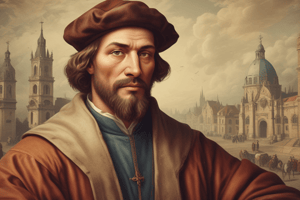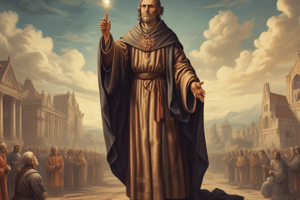Podcast
Questions and Answers
¿Cuál fue el tema central de la Reforma Protestante del siglo XVI?
¿Cuál fue el tema central de la Reforma Protestante del siglo XVI?
- La separación de la Iglesia de Inglaterra de la Iglesia Católica
- El establecimiento de la Inquisición
- La reforma de la Iglesia Católica y la crítica a las indulgencias (correct)
- La lucha entre católicos y protestantes en Europa
¿Quién fue un figura clave en la Reforma Protestante y publicó las 95 tesis en 1517?
¿Quién fue un figura clave en la Reforma Protestante y publicó las 95 tesis en 1517?
- Martín Lutero (correct)
- Huldrych Zwingli
- Juan Knox
- Juan Calvino
¿Cuál fue el objetivo principal del Concilio de Trento?
¿Cuál fue el objetivo principal del Concilio de Trento?
- Establecer una alianza entre la Iglesia Católica y los estados europeos
- Detener la expansión del Protestantismo en Europa
- Condenar la herejía y la brujería
- Definir la doctrina católica y responder a los desafíos protestantes (correct)
¿Qué doctrine desarrolló Juan Calvino en su teología?
¿Qué doctrine desarrolló Juan Calvino en su teología?
¿Qué fue el resultado de la Contrarreforma Católica?
¿Qué fue el resultado de la Contrarreforma Católica?
¿Quién fundó la tradición calvinista?
¿Quién fundó la tradición calvinista?
¿Qué fue el resultado de la Reforma Protestante?
¿Qué fue el resultado de la Reforma Protestante?
¿Qué obra de Martín Lutero tradujo la Biblia al alemán?
¿Qué obra de Martín Lutero tradujo la Biblia al alemán?
¿Qué fue el Concilio de Trento?
¿Qué fue el Concilio de Trento?
¿Quién fue un líder importante de la Reforma Protestante en Suiza?
¿Quién fue un líder importante de la Reforma Protestante en Suiza?
Flashcards are hidden until you start studying
Study Notes
Protestant Reformation
- A 16th-century movement that sought to reform the Catholic Church and led to the emergence of Protestantism
- Key issues:
- Corruption and sale of indulgences
- Clerical abuses and lack of biblical knowledge
- Theology and doctrine, particularly justification by faith alone
- Major figures:
- Martin Luther
- John Calvin
- Huldrych Zwingli
- John Knox
- Impact:
- Led to the formation of new Christian denominations (e.g., Lutheran, Calvinist, Anglican)
- Changed the religious and political landscape of Europe
Catholic Counter-Reformation
- A response to the Protestant Reformation, aiming to reform the Catholic Church and counter Protestantism
- Key aspects:
- Ecclesiastical reforms, such as the Council of Trent
- Spiritual renewal, emphasizing piety and devotion
- Inquisition and persecution of Protestants
- Establishment of new religious orders, like the Jesuits
- Major figures:
- Pope Paul III
- Pope Pius V
- Ignatius of Loyola
- Teresa of Ávila
- Impact:
- Strengthened Catholic Church's authority and doctrine
- Led to a renewed sense of Catholic identity and mission
Martin Luther
- German theologian and monk, key figure in the Protestant Reformation
- Key contributions:
- Published the 95 Theses (1517), criticizing indulgences and sparking the Reformation
- Developed the doctrine of justification by faith alone
- Translated the Bible into German, making it accessible to the masses
- Notable works:
- "On the Freedom of a Christian" (1520)
- "The Bondage of the Will" (1525)
- Impact:
- Founded Lutheranism, one of the major Protestant denominations
- Influenced other Protestant Reformers, such as Calvin and Zwingli
Council of Trent
- A major Catholic ecumenical council, held from 1545 to 1563
- Key goals:
- Define Catholic doctrine and respond to Protestant challenges
- Reform the Church's practices and institutions
- Clarify the role of Scripture, tradition, and authority
- Major decisions:
- Affirmed the authority of Scripture and tradition
- Defined the seven sacraments and the role of the priesthood
- Established the Index of Prohibited Books
- Impact:
- Shaped Catholic theology and practice for centuries
- Strengthened the Catholic Church's response to Protestantism
John Calvin
- French theologian and pastor, key figure in the Protestant Reformation
- Key contributions:
- Developed the doctrine of predestination and the concept of "total depravity"
- Founded the Calvinist tradition, which emphasized the sovereignty of God
- Established the Geneva Academy, a center for Reformed theology
- Notable works:
- "Institutes of the Christian Religion" (1536)
- "Commentaries on the Bible"
- Impact:
- Founded the Presbyterian and Reformed traditions
- Influenced other Protestant Reformers, such as Zwingli and Knox
La Reforma Protestante
- Movimiento del siglo XVI que buscó reformar la Iglesia Católica y llevó al surgimiento del Protestantismo
- Problemas clave:
- Corrupción y venta de indulgencias
- Abusos clericales y falta de conocimientos bíblicos
- Teología y doctrina, particularmente la justificación por la fe sola
- Figuras clave:
- Martín Lutero
- Juan Calvino
- Huldrych Zwingli
- Juan Knox
- Impacto:
- Llevó a la formación de nuevas denominaciones cristianas (por ejemplo, Luterana, Calvinista, Anglicana)
- Cambió el paisaje religioso y político de Europa
Contrarreforma Católica
- Respuesta a la Reforma Protestante, con el objetivo de reformar la Iglesia Católica y contrarrestar el Protestantismo
- Aspectos clave:
- Reformas eclesiásticas, como el Concilio de Trento
- Renovación espiritual, enfocándose en la piedad y la devoción
- Inquisición y persecución de protestantes
- Establecimiento de nuevas órdenes religiosas, como la Compañía de Jesús
- Figuras clave:
- Papa Paulo III
- Papa Pío V
- Ignacio de Loyola
- Teresa de Ávila
- Impacto:
- Fortaleció la autoridad y la doctrina de la Iglesia Católica
- Llevó a un sentido renovado de identidad y misión católica
Martín Lutero
- Teólogo y monje alemán, figura clave en la Reforma Protestante
- Contribuciones clave:
- Publicó las 95 Tesis (1517), criticando las indulgencias y desencadenando la Reforma
- Desarrolló la doctrina de la justificación por la fe sola
- Tradujo la Biblia al alemán, haciéndola accesible a las masas
- Obras notables:
- "De la Libertad de un Cristiano" (1520)
- "La Esclavitud de la Voluntad" (1525)
- Impacto:
- Fundó el Luteranismo, una de las principales denominaciones protestantes
- Influenció a otros reformadores protestantes, como Calvino y Zwingli
Concilio de Trento
- Concilio ecuménico católico destacado, celebrado desde 1545 hasta 1563
- Objetivos clave:
- Definir la doctrina católica y responder a los desafíos protestantes
- Reformar las prácticas y instituciones de la Iglesia
- Clarificar el papel de la Escritura, la tradición y la autoridad
- Decisiones clave:
- Afirmó la autoridad de la Escritura y la tradición
- Definió los siete sacramentos y el papel del sacerdocio
- Estableció el Índice de Libros Prohibitidos
- Impacto:
- Dio forma a la teología y práctica católica durante siglos
- Fortaleció la respuesta católica al Protestantismo
Studying That Suits You
Use AI to generate personalized quizzes and flashcards to suit your learning preferences.




